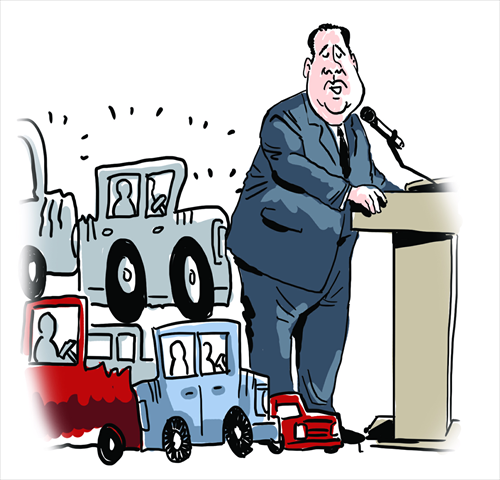Governor Christie’s troubles could deal blow to civic participation

Illustration: Liu Rui/GT
Some weeks ago, New Jersey Governor Chris Christie's political future seemed very bright. He had been reelected, despite being a Republican in a Democratic state, by a very large majority. His fellow Republican governors chose him as chair of the Republican Governors Conference, a body with much influence in their party as it prepares for the 2014 Congressional and Senatorial elections and the next presidential election in 2016.
The governor reached a high point some days before the Presidential Election of November 2012. A very strong storm had caused damage and flooding to large parts of his coastal state. He was at pains to receive President Barack Obama cordially - after all, the president was bringing billions of dollars of federal money as storm relief to the state.
Many Republicans were aghast, and openly or in whispers accused Christie of aiding the president in his campaign. What was important to Christie, however, was his own campaign to be the Republican candidate in 2016, his carefully constructed image of someone free of conventional political calculations.
That led him to other calculations, as when he made a speech at the Republican convention of 2012 which ignored Mitt Romney, the party's candidate, and concentrated on the works and thoughts of Governor Christie.
In fact, the governor is, in his ideas and policies, a very conventional Republican. He favors large-scale capitalism rather than large-scale government. He dispenses harsh criticism of the state's teachers and their union, but not funding for schools.
New Jersey calls itself "The Garden State" on account of its farms. Those who have been on its highways note that its atmosphere is anything but pure. The governor is silent, at best, on environmental issues.
Above all, the governor seems to have little instinctive sympathy for the 50 or 60 percent of the citizenry who are struggling economically.
Now the governor faces a crisis which may - it is far too early to tell - not only block his presidential ambitions, but drive him out of public life.
It began in September, when the two-state (New Jersey and New York) authority controlling the region's infrastructure inexplicably blocked the access roads from the George Washington Bridge connecting the states to the small New Jersey town at its end.
The bridge is the world's busiest, and chaos ensued. The town's mayor could not persuade the authority to open the roads for four days - and never got a convincing explanation of who had ordered them closed, or why.
Asked about the matter at a press conference, the governor joked about it. He is not laughing now. A journalist obtained documentation making clear that one of the governor's senior staff members, working with a person he placed on the authority, may well have ordered the closure.
The governor promptly dismissed some of his staff, apologized for his lack of vigilance, but proclaimed his own ignorance of the entire matter.
There is a saying to the effect that one misfortune never comes alone. The governor has now been criticized for using the threat to withhold federal monies given for storm relief from several New Jersey towns, so as to compel mayors to agree with development projects the governor was sponsoring, projects funded and managed by groups of private investors.
The governor faces two investigations. One is being conducted by the New Jersey state legislature. The other has been begun by the Federal Attorney for New Jersey.
The national Republican Party has been shaken by the governor's troubles. He seemed to be the one presidential candidate in their ranks who could appeal to those who otherwise voted for the Democrats.
The scandal has inflicted a far greater injury to the nation. Only 60 percent of Americans vote in presidential elections, and in the equally important Congressional and state elections, the figure declines to 40 percent.
A US majority dependent upon government programs in education, healthcare, retirement pensions and much else thinks "government" is its adversary.
The Christie case reinforces the withdrawal of many citizens from civic participation - which they see as either futile or one US fraud among many others.
A popular hero is in serious danger of being exposed as one of the public figures he has so fulsomely denounced. That is a potential blow to our entire political system. The Democrats' poorly concealed delight at their antagonist's troubles is quite beside the point.
The author is professor emeritus of Georgetown University Law Center. opinion@globaltimes.com.cn